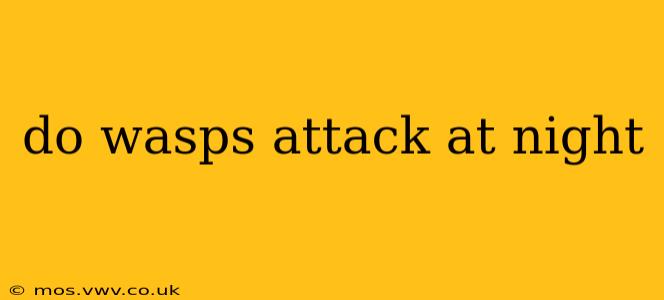Do Wasps Attack at Night? Unraveling the Nocturnal Habits of Wasps
The question of whether wasps attack at night is a common one, sparking curiosity and, for many, a healthy dose of fear. The short answer is: generally, no, wasps are not typically aggressive at night. However, the reality is more nuanced than a simple yes or no. Several factors influence wasp behavior after dark, making it crucial to understand their nocturnal habits.
What is different about wasp behaviour at night?
Most wasp species are diurnal, meaning they are active during the day. Their primary activities – foraging for food, building nests, and caring for young – are all significantly hampered by darkness. Reduced visibility and lower temperatures make these tasks considerably more difficult. Their metabolic rates also slow down at night. This reduced activity level translates into a lower likelihood of aggressive encounters.
Do any wasps become active at night?
While most wasps are inactive at night, there are exceptions. Some nocturnal species do exist, although they are less common than their daytime counterparts. These species have adapted to thrive under the cover of darkness, often employing different hunting strategies. For example, some species are attracted to lights at night, potentially leading to more interactions with humans.
Why would a wasp sting at night?
While unlikely, there are scenarios where a wasp might sting at night:
- Defensive Behavior: If you accidentally disturb a nest at night (e.g., by stepping on it or accidentally brushing against it), a wasp may sting defensively to protect itself and its colony. This is true regardless of the time of day.
- Trapped or Disoriented: A wasp that has become trapped inside a home or other structure might sting if it feels threatened while trying to escape.
- Attracted to Light: Certain species drawn to artificial lights might be more likely to encounter humans at night, potentially leading to stings if they feel threatened.
Are wasps more aggressive at night than during the day?
No, wasps are generally less aggressive at night than during the day. Their reduced activity and slower metabolism contribute to a lower likelihood of stinging. However, it's crucial to remember that any wasp, regardless of the time of day, will sting if it feels threatened or its nest is disturbed.
How can I avoid wasp stings at night?
Even though wasp attacks are less likely at night, taking precautions is always wise.
- Keep lights off or use yellow bug lights: Bright lights can attract wasps. Yellow lights are less attractive to insects than white or blue lights.
- Seal cracks and gaps: Prevent wasps from entering your home by sealing any openings in walls, windows, and doors.
- Avoid sweet smells at night: Wasps are attracted to sweet smells; minimizing these near entrances can help deter them.
- Check for nests before outdoor activities: If you plan any nighttime outdoor activities, take a moment to check for nests in your immediate vicinity.
In conclusion, while the possibility of a wasp sting at night exists, it is statistically less likely than during the day. Understanding their nocturnal behavior and taking preventative measures can help minimize the risk. Remember, the best way to avoid wasp stings is to respect their space and avoid disturbing their nests.
